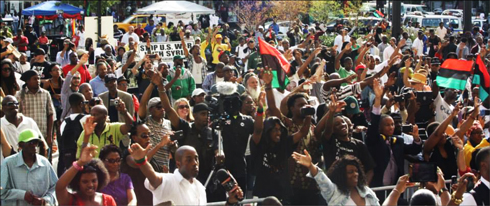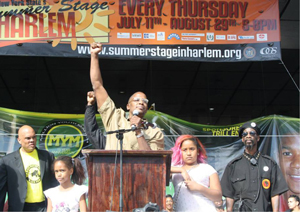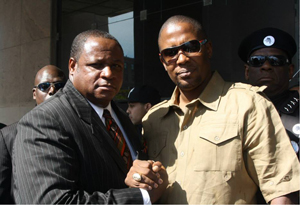By Saeed Shabazz-Staff Writer-

NEW YORK (FinalCall.com) – In commemoration of the 1998 Million Youth March, activists, rappers and community leaders gathered outside the Adam Clayton Powell N.Y. State Office Building on 125th Street in Harlem.
Event organizers said the Saturday rally was needed to focus on youth empowerment through education, developing self-pride and improving their economic situation.
At the first Million Youth March in 1998, which took place on Malcolm X Blvd., speakers made a similar call for unity and peace, demanding a grassroots war against racism while calling the march the beginning of a movement. The 1998 march is remembered for the violent clash between police and participants which left injuries on both sides.

“We come here in peace, to learn, to understand and to move forward,” a march co-coordinator told reporters Sept 7.
Malik Zulu Shabazz, leader of the New Black Panther Party and co-convener of the 15th anniversary commemoration along with Min. Hashim Nzinga, told The Final Call: “I am very happy because we have carried on the work of Dr. Khalid Muhammad.”
Dr. Muhammad, founder of the NBPP convened the initial MYM. He died in 2006. “Fifteen years ago a bold Black man convened the first MYM; and today 15 years later I ask you who is here to talk about our youth,” said Mr. Shabazz during his address.
“We gather to let Black people know there is another viewpoint; a vision of self-determination by our brightest youth,” he added. We are going to let the community know what Black Power looks like, Mr. Shabazz said.
“We cannot talk power–we have to take power!” declared Brooklyn Councilman Charles Barron. The MYM must start a political movement, running Black conscious politicians for office and igniting a catalyst toward control of the political process in “chocolate cities” across America, he told The Final Call.
Jasiri X, a Pittsburgh-based emcee, rapper and community activist told the gathering: “Let’s make this beyond this day.”
“I feel like we need to keep moving forward. We got comfortable after the civil rights movement. We need to work together for equality still,” commented Trev Bell, president of The Black Male Agenda.
Some in the crowd complained openly of the low turnout, about 500 people, and that event organizers were not really going after the important issues facing youth. Others said youth participating in the rally showed a passion and understanding of issues.

“The positive energy of the whole thing drew me in,” said Cosmic, 20. “I came to see what the whole event was about and understand the people,” added Savion Williams, 13.
Student Minister Abdul Hafeez Muhammad, of the Nation of Islam’s Mosque No. 7 in Harlem, said youth must be taught what the Honorable Minister Louis Farrakhan is teaching about “The Time and What Must be Done lecture series.” We are here to share the direction Min. Farrakhan is pointing us towards, he said. Unity remains an essential part of the Minister’s message. “The time is now for all Black civil rights, religious and economic leaders to come together for strategic planning aimed at solutions,” said Min. Farrakhan during his 52 week Lecture Series. “The Time and What Must Be Done.” “All great minds and all hands on deck are needed to solve the critical problems that Black people in America face,” said the Minister.
Rapper Grandmaster Mellie Mel told The Final Call parents must be harder on their children. “Like back in the old days, we were told what to do, and we did it or else,” said one of the god-fathers of hip hop culture.
One of the often heard complaints from youth attending the rally was the inability to find work. On Sept. 6, a Washington, D.C.-based youth advocacy organization released a jobs report for August. The unemployment rate for Black youth 18-29 years old was 21.6 percent; the unemployment rate for 18-29 year old Latinos was 12.8 percent.
Evan Feinberg, president of Generation Opportunity, whose group published the figures, said, “As the summer draws to a close, young people are no better off than we were three months ago. Practically all of the jobs created this summer were part-time, and precious few even went to young people.”
Sequan Morgan contributed to this story.












